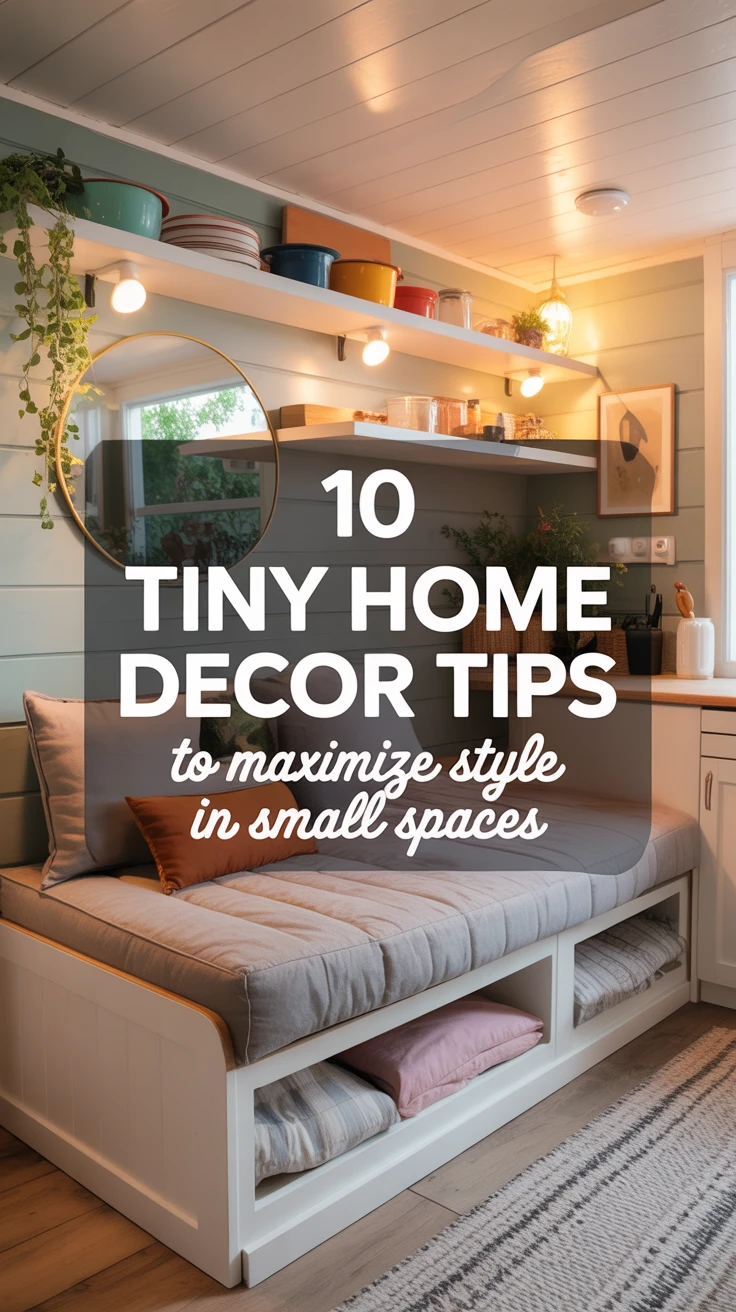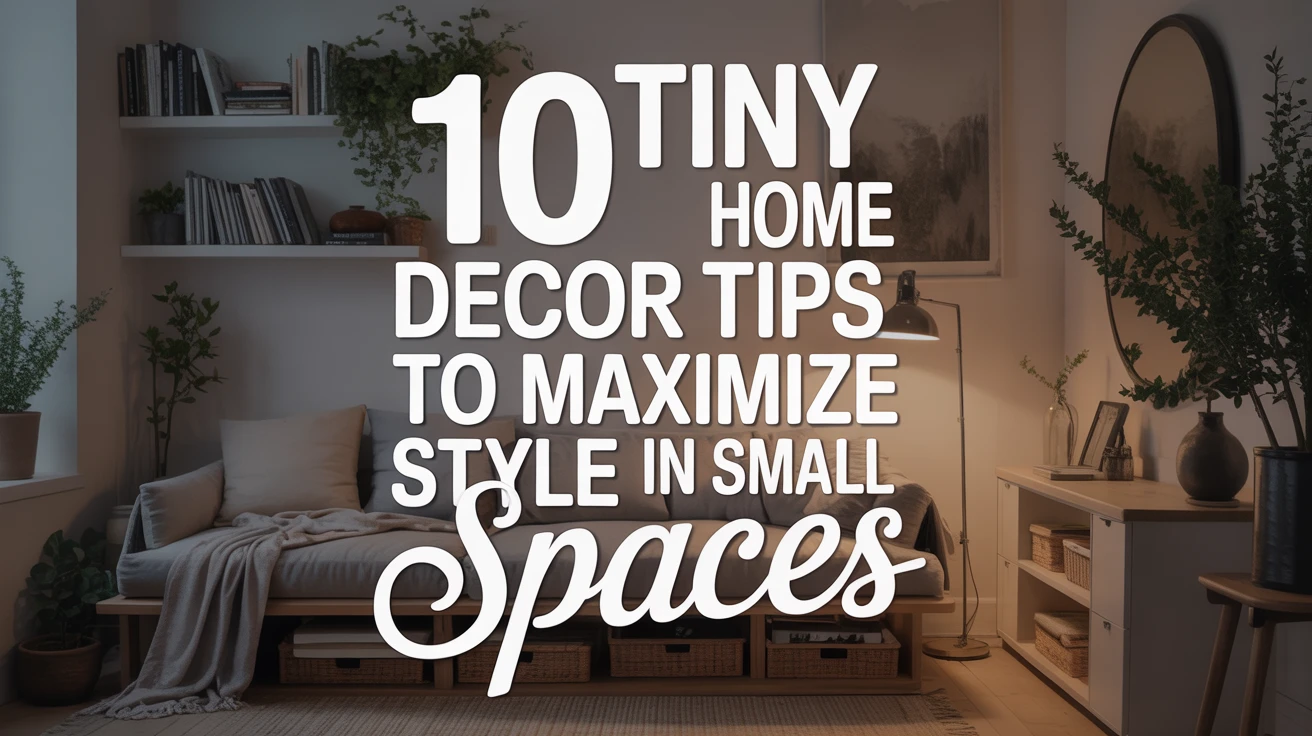
The Art of Decorating Tiny Homes
When I first moved into my 400-square-foot studio apartment, I felt overwhelmed by the challenge of fitting my life into such a small space while keeping it stylish. After months of trial and error (and yes, a few furniture-arrangement disasters), I discovered that tiny home decor isn’t just about squeezing things in—it’s about thoughtful curation and smart design choices.
Whether you’re living in a tiny house, studio apartment, or compact condo, the art of decorating small spaces requires both creativity and practicality. In this article, I’ll share my top 10 tips for maximizing style without sacrificing precious square footage. These strategies have transformed my own tiny living space from cramped to cozy and functional.
1. Go Multi-functional: Furniture That Does Double Duty
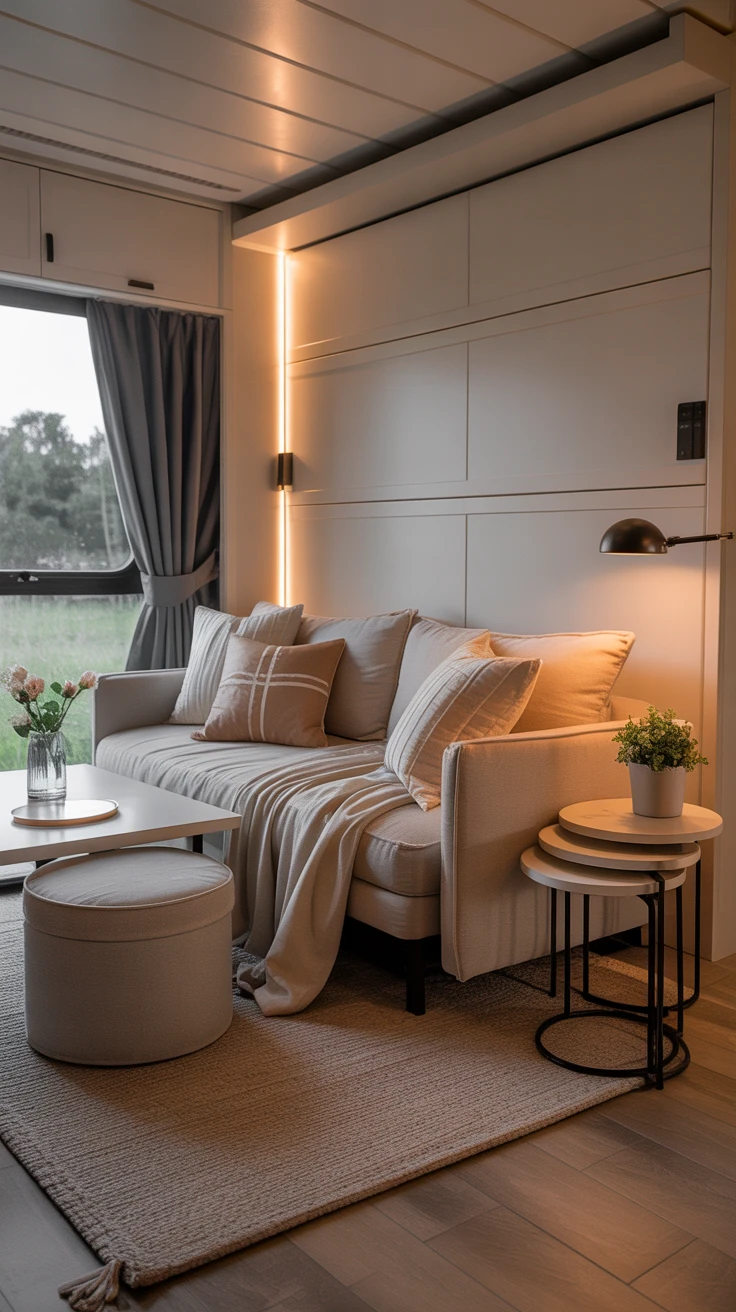
The first rule of tiny home decor is making every piece earn its keep. Multi-functional furniture has been my saving grace in small spaces.
When I invested in a sleeper sofa with built-in storage, it transformed my living area into a guest bedroom when needed while providing hidden storage for extra bedding. This single purchase eliminated the need for a separate guest bed and linen closet.
- Sofa beds or futons that transform from seating to sleeping
- Extendable dining tables that can shrink when not in use
- Nesting tables that can be separated when entertaining
- Storage ottomans that provide seating, surface space, and storage
- Murphy beds that fold into the wall when not needed

View on AmazonAs an Amazon Associate, I earn from qualifying purchases.

View on AmazonAs an Amazon Associate, I earn from qualifying purchases.
Pro Tip: Consider custom-built furniture for oddly shaped spaces. I had a carpenter create a corner desk that perfectly fit my awkward bay window nook, maximizing a space that would have otherwise been wasted.
2. Rise Up: Embrace Your Vertical Space
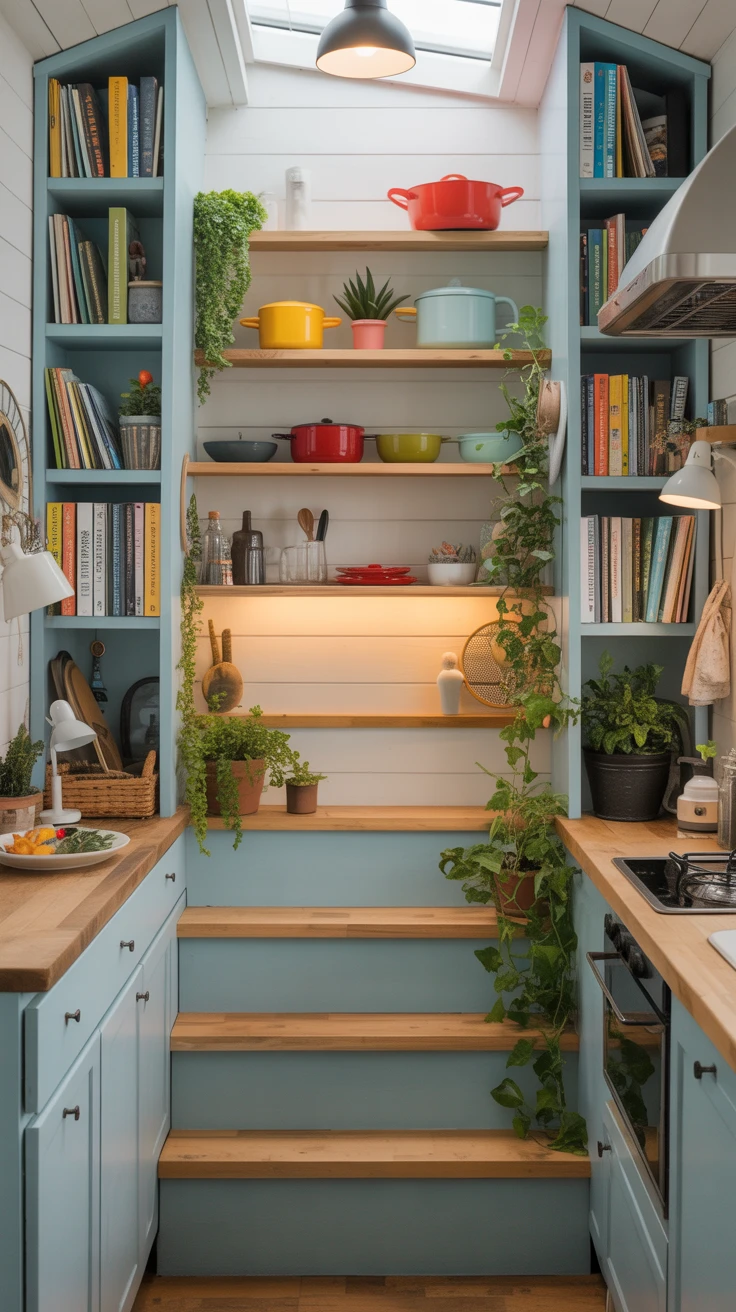
When floor space is limited, look up! Vertical space is often underutilized in small homes, yet it offers tremendous potential for both storage and style.
I transformed my tiny kitchen by installing floating shelves all the way to the ceiling. Not only did this triple my storage capacity, but displaying my colorful cookware and plants created visual interest that draws the eye upward, making the room feel taller.
- Install floating shelves in unexpected places (above doorways, windows)
- Use tall, narrow bookcases instead of wide, short ones
- Hang plants from the ceiling to add greenery without using surface space
- Mount lighting fixtures on walls instead of using floor lamps
Pro Tip: Install floor-to-ceiling bookcases for dramatic effect. I painted mine the same color as my walls to create a built-in look that adds architectural interest while maximizing storage.
3. The Power of Light: Color Palettes That Open Up Space
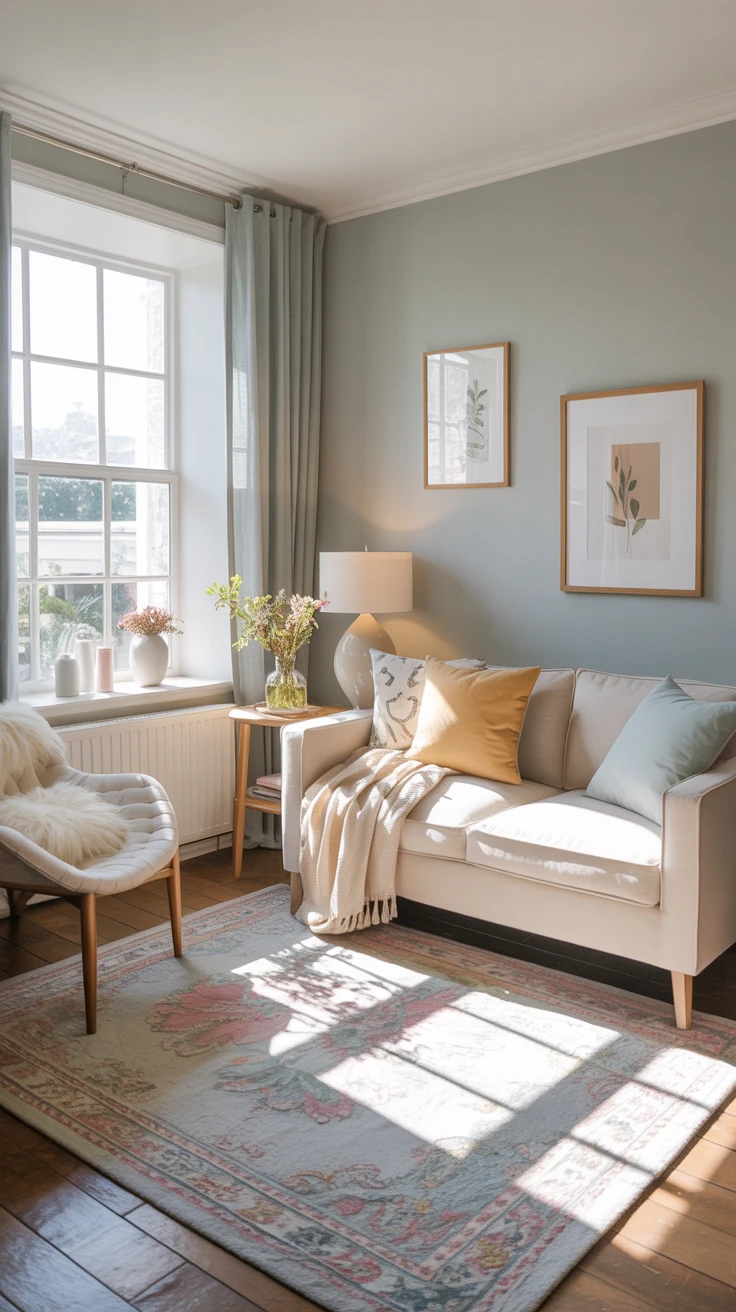
Dark colors can make small spaces feel like caves—a lesson I learned the hard way after painting my bathroom a deep navy blue. While it looked stunning in the Pinterest image, it made my tiny bathroom feel claustrophobic.
Light colors reflect more light, creating the illusion of more space. After repainting with a soft, pale gray, my bathroom instantly felt twice as large.
- Opt for whites, creams, and light pastels for walls
- Use the same color family throughout to create flow between spaces
- If you crave color, add it through accessories rather than wall paint
- Consider light-colored furniture to maintain the airy feel
4. Reflect and Expand: The Magic of Mirrors

Mirrors are perhaps the most powerful tool in tiny home decor. They reflect light, create the illusion of depth, and can make a space feel significantly larger.
In my entryway, I hung a large mirror opposite the window, which not only makes the narrow hallway feel wider but also doubles the natural light. Visitors often comment on how spacious my entry feels, despite it being barely four feet wide.
- Position mirrors opposite windows to maximize light reflection
- Use a large statement mirror as a focal point in small rooms
- Try mirrored furniture for subtle space-enhancing effects
- Consider a gallery wall of smaller mirrors for both style and function

View on AmazonAs an Amazon Associate, I earn from qualifying purchases.

View on AmazonAs an Amazon Associate, I earn from qualifying purchases.
Pro Tip: For maximum impact, choose a mirror that’s almost as large as the wall it hangs on. The reflection will create the illusion of another room beyond.
5. Smart Storage: Decor That Hides and Holds

In tiny spaces, every decorative item should ideally serve a purpose beyond just looking pretty. When I realized my collection of purely decorative objects was creating clutter, I replaced them with beautiful items that also provide storage.
My living room now features decorative baskets that store everything from throw blankets to electronics, vintage suitcases stacked as a side table that hold seasonal clothing, and a beautiful ceramic jar that conceals my TV remotes.
- Decorative baskets and bins for corralling small items
- Hollow ottomans and benches for hidden storage
- Vintage trunks that serve as coffee tables and storage
- Decorative hooks that add personality while providing hanging space
6. Less is More: The Minimalist Approach
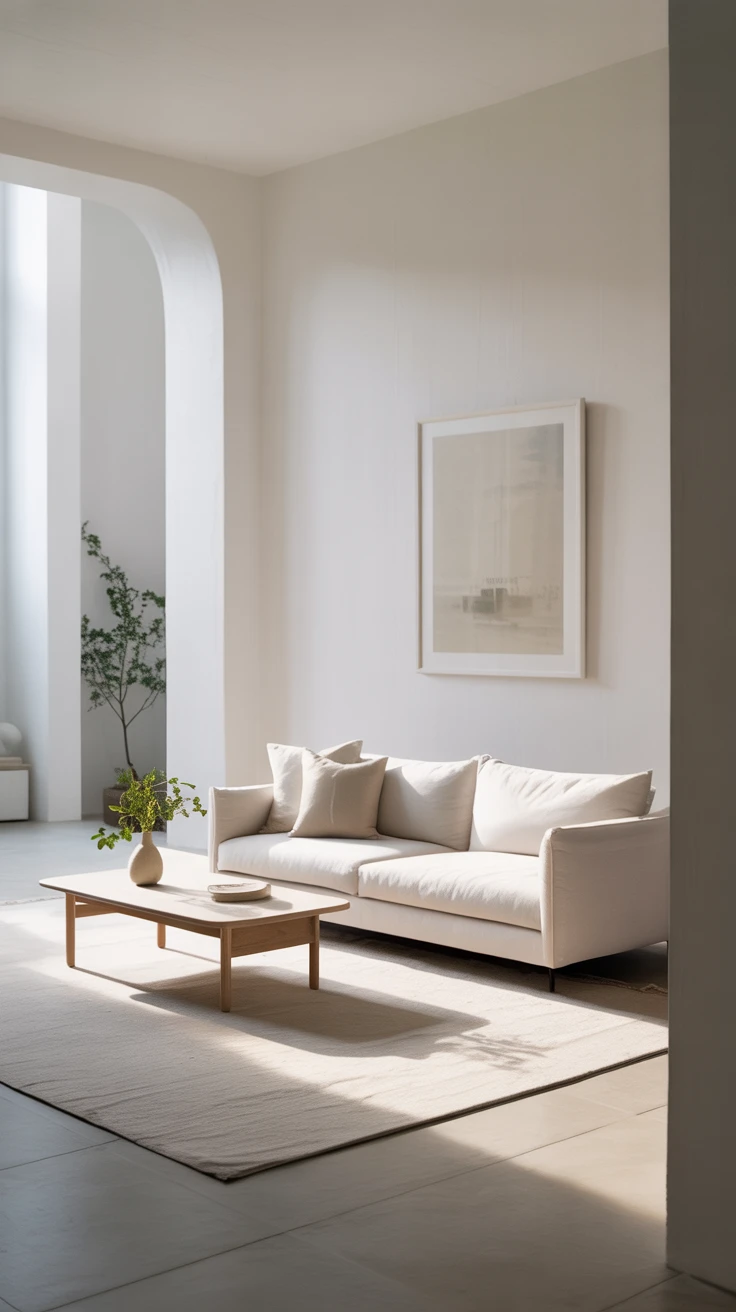
Living small forced me to embrace minimalism—not just as an aesthetic choice but as a practical necessity. I now carefully consider every item that enters my home, asking whether it’s both useful and beautiful.
This doesn’t mean my space lacks personality. Rather, I’ve become more intentional about what I display. Instead of twenty mediocre decorative items, I showcase five that I truly love and that tell my story.
- Curate possessions ruthlessly, keeping only what you use or truly love
- Rotate seasonal decor rather than displaying everything at once
- Choose quality over quantity for both furniture and accessories
- Embrace negative space—not every wall or surface needs something on it

View on AmazonAs an Amazon Associate, I earn from qualifying purchases.

View on AmazonAs an Amazon Associate, I earn from qualifying purchases.
7. Green and Serene: Bringing Nature Indoors
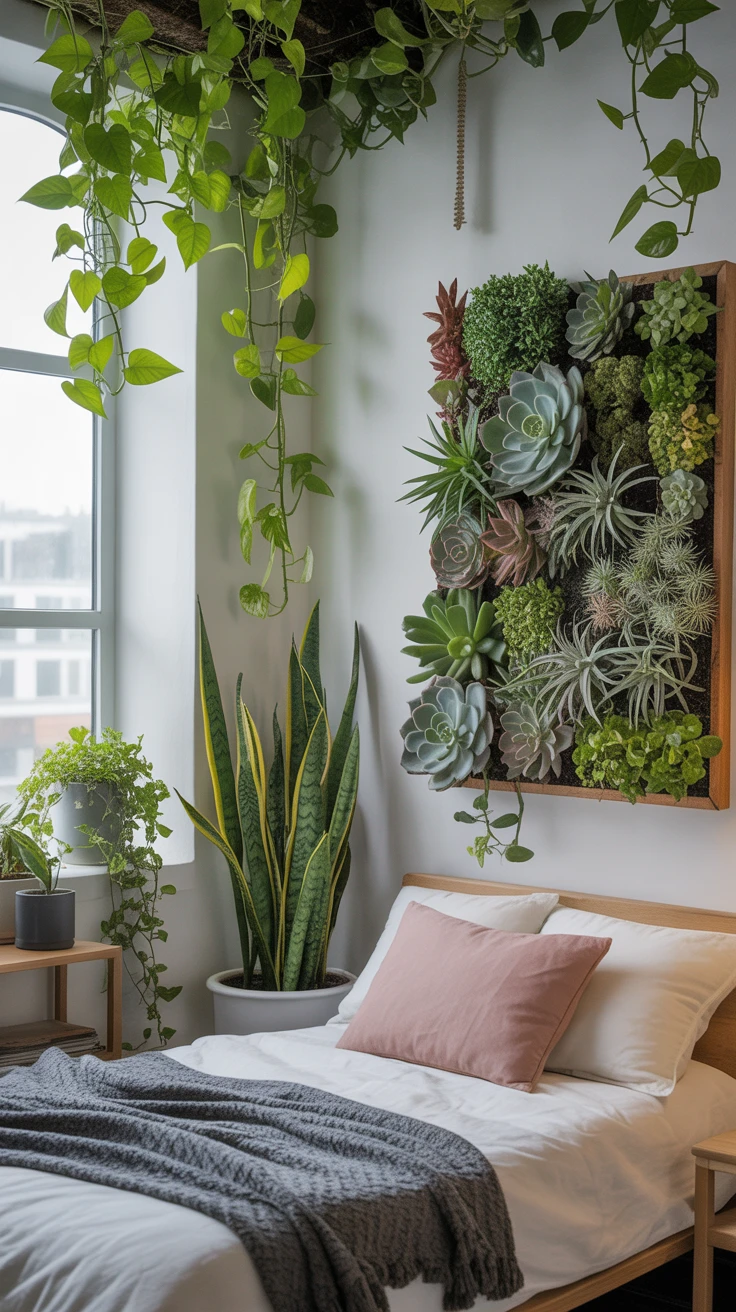
Plants have transformed my tiny apartment more than any other decorative element. They add life, texture, and color without creating visual clutter. Plus, studies show they improve air quality and mood—both especially important in small spaces.
After killing several plants (turns out, not all spaces have adequate light), I’ve found success with hardy varieties like pothos, snake plants, and ZZ plants that thrive even in less-than-ideal conditions.
- Hang plants from the ceiling to add greenery without using surface space
- Use wall-mounted planters for vertical gardens
- Place larger floor plants in empty corners to soften the space
- Consider air plants and small succulents for shelves and tabletops
8. Hidden Spaces: Making the Most of Under-Furniture Storage
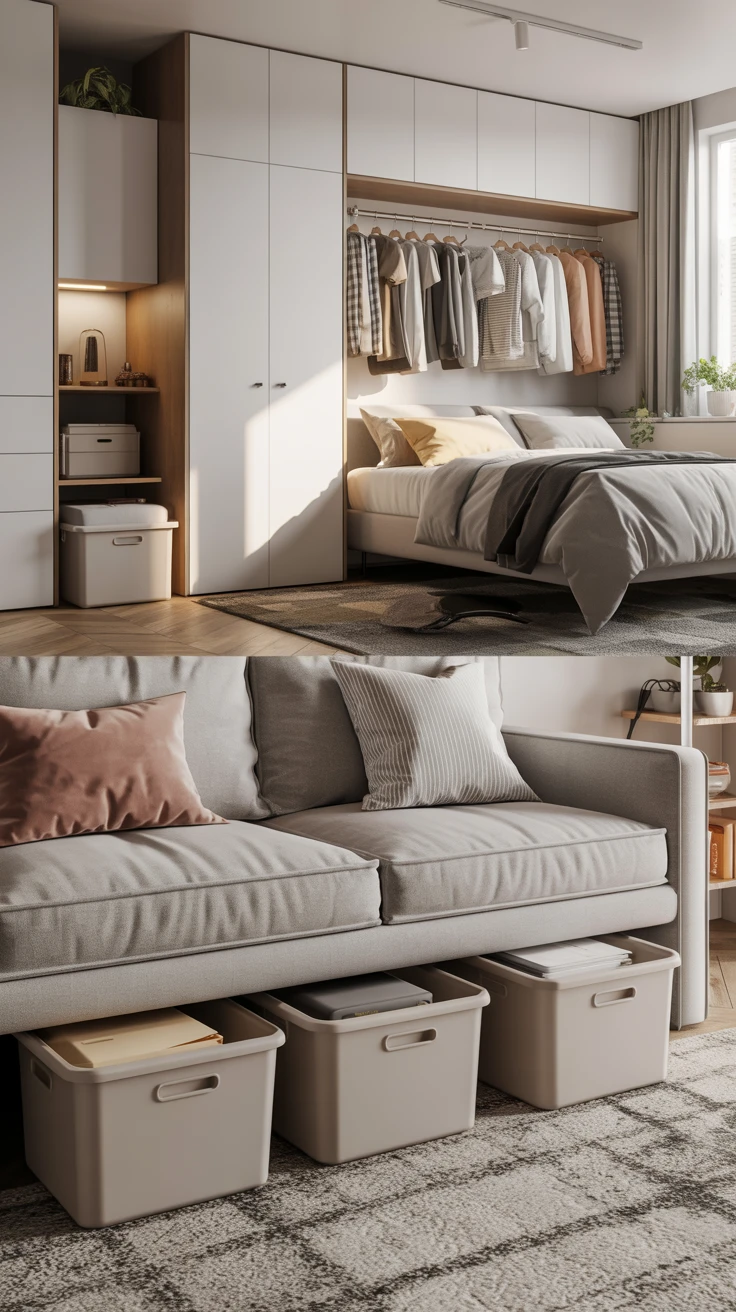
The space under furniture represents prime real estate in a tiny home. When I realized how much unused space existed under my bed and sofa, I invested in storage solutions that helped me reclaim these hidden areas.
Under-bed storage containers now hold out-of-season clothing and extra bedding, while low-profile bins slide easily under my sofa, storing everything from gift wrapping supplies to workout equipment.
- Use bed risers to create more storage height under your bed
- Invest in rolling under-bed storage containers for easy access
- Look for sofas and chairs with adequate clearance underneath
- Consider furniture with built-in storage to eliminate the need for separate solutions

View on AmazonAs an Amazon Associate, I earn from qualifying purchases.

View on AmazonAs an Amazon Associate, I earn from qualifying purchases.
9. Personal Touches: Art and Accents in Tiny Spaces
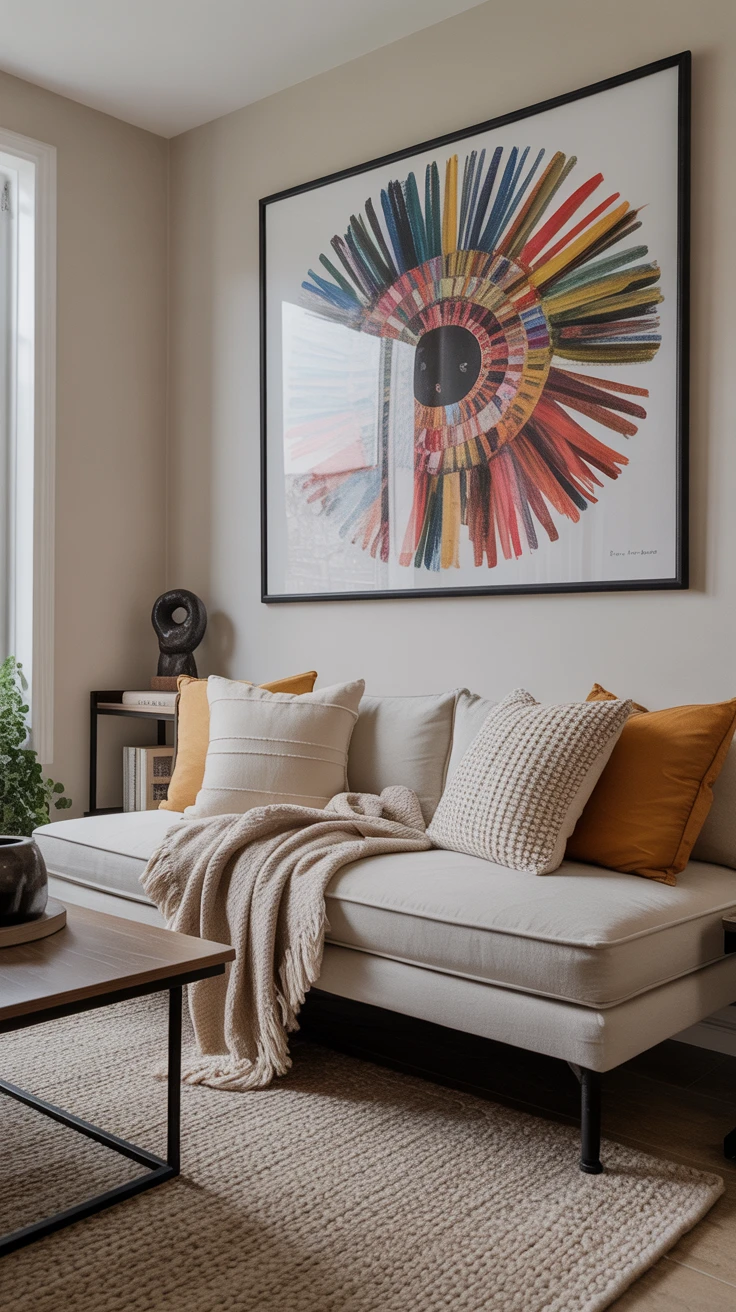
Small spaces need personality to feel like home. Initially, I was afraid to add decorative elements to my tiny apartment, fearing they would create clutter. I’ve since learned that thoughtfully chosen art and accents actually make a space feel more intentional and complete.
Instead of many small art pieces that created visual noise, I invested in one large statement piece above my sofa. It draws the eye, adds color, and expresses my personality without cluttering the space.
- Choose one or two larger art pieces rather than many small ones
- Use textiles like pillows and throws to add color and texture
- Select meaningful accents that tell your story
- Consider the scale—oversized art can actually make a small space feel larger
Maximize Style, Maximize Space
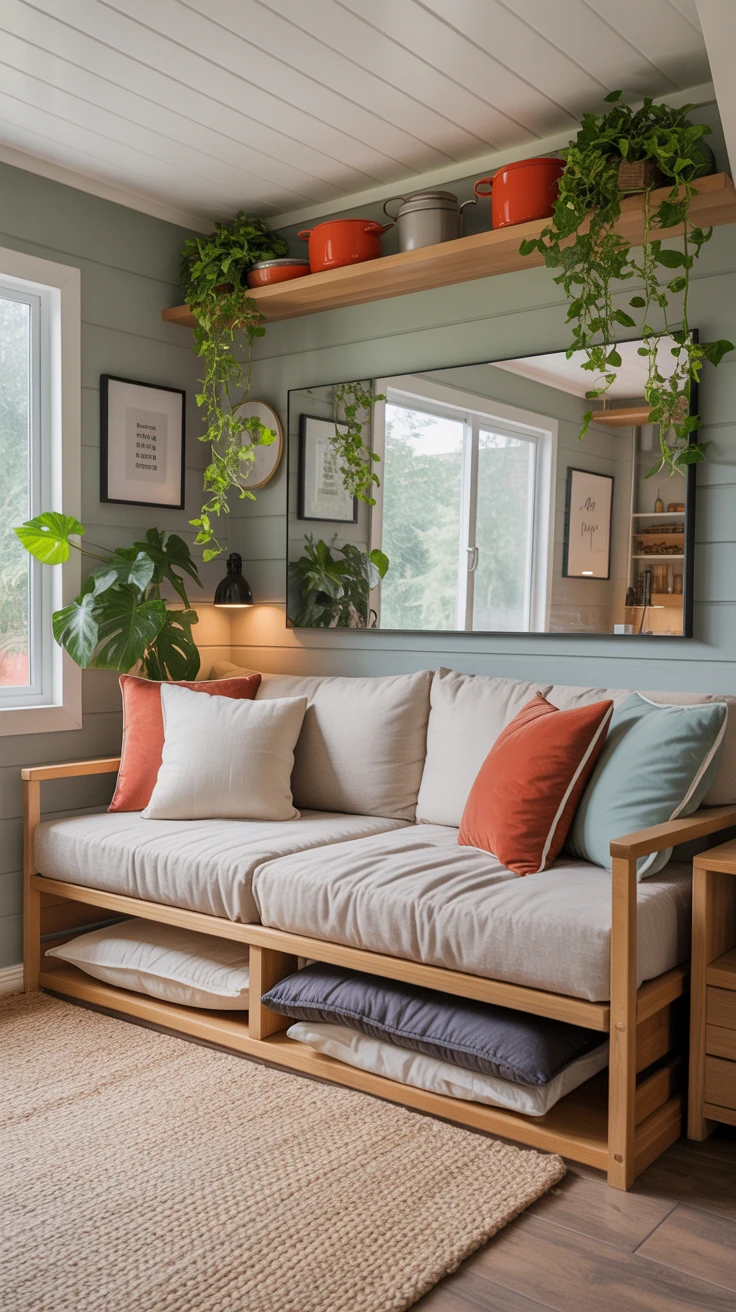
Decorating a tiny home doesn’t mean sacrificing style or personality. By embracing multi-functional furniture, utilizing vertical space, choosing light colors, incorporating mirrors, selecting storage-friendly decor, adopting a minimalist approach, adding natural elements, utilizing under-furniture space, and personalizing with meaningful accents, you can create a space that feels both spacious and uniquely yours.
Remember that tiny home decor is as much about what you leave out as what you include. Each item should earn its place through function, beauty, or ideally both. With thoughtful curation and strategic design choices, even the smallest spaces can become stylish, comfortable havens that reflect your personality and meet your needs.
Frequently Asked Questions
What is the best way to decorate a tiny home?
The best approach is to prioritize multi-functional furniture, embrace vertical space, use light colors, and be intentional about every item you bring into your home. Focus on pieces that serve both practical and aesthetic purposes, and don’t be afraid to edit regularly.
How can I make a small room look bigger?
Use light colors on walls, incorporate mirrors to reflect light and create the illusion of depth, keep furniture proportional to the space, and maintain clear pathways through the room. Reducing clutter and using fewer, larger decorative items rather than many small ones also helps a space feel more open.
What furniture is best for small spaces?
Look for multi-functional pieces like sofa beds, extendable tables, storage ottomans, and furniture with built-in storage. Choose pieces with legs that allow you to see underneath them, creating a sense of openness. Scale is important—furniture should be proportional to your space rather than oversized.
Are there specific colors that make a room appear larger?
Light colors generally make spaces feel larger because they reflect more light. Whites, creams, light grays, and soft pastels are excellent choices. For a cohesive look that enhances spaciousness, consider painting walls, trim, and ceiling the same or similar colors to eliminate visual breaks.
How do I personalize a small space without cluttering it?
Be selective about personal items, choosing quality over quantity. Rotate collections rather than displaying everything at once. Use walls for personal photos or art rather than surfaces, and incorporate your personality through textiles, a statement art piece, or a few meaningful accessories rather than numerous small items.
